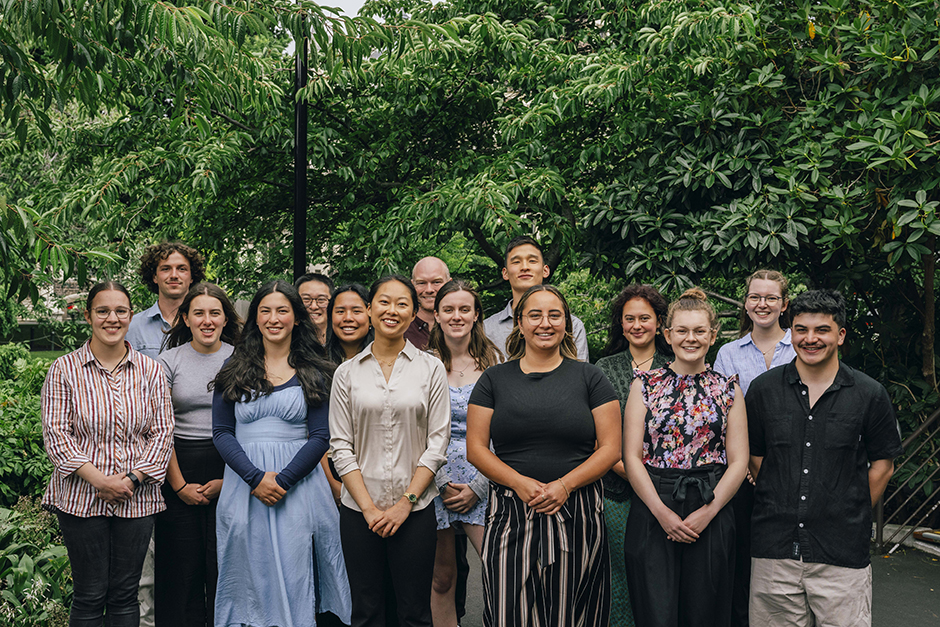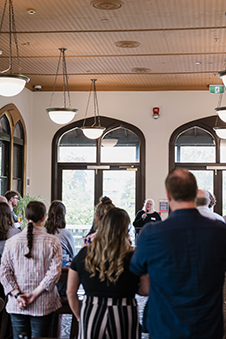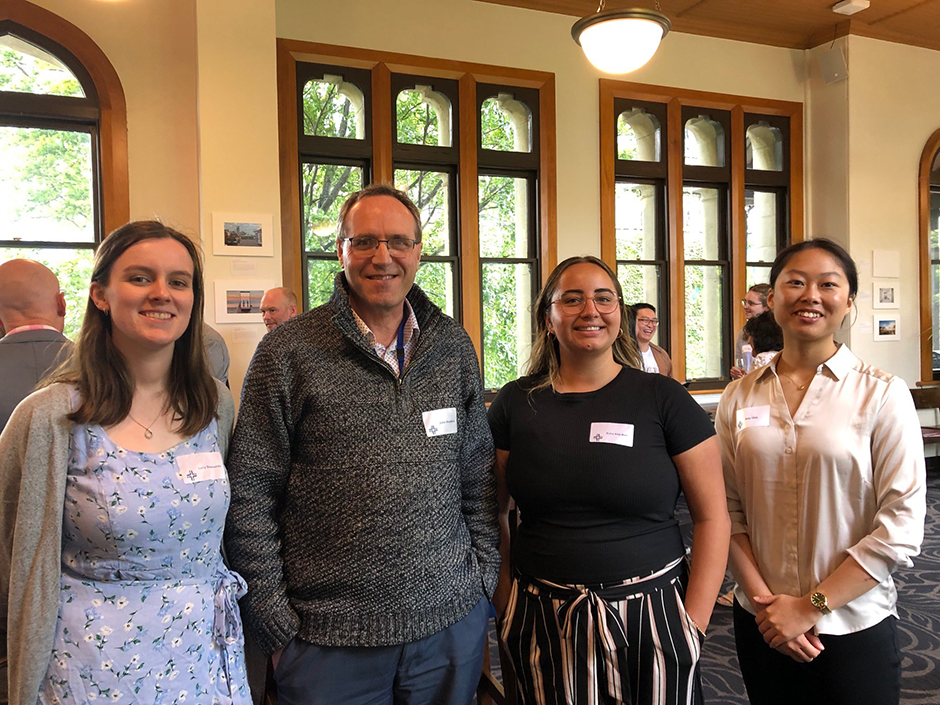
Otago Medical Research Foundation summer scholarship students 2023-24
Having a real research experience, with unexpected problems and outcomes, was a highlight shared by students and their supervisors at the recent Otago Medical Research Foundation’s (OMRF) Summer Research Scholarships get together.
Held at the Staff Club at the University of Otago, the gathering brought together the summer research students, their project supervisors, scholarship donors and staff from OMRF and the University.
OMRF Director of Development Susan Sims says the evening was a way to bring all the different people involved with the scholarships together and to acknowledge the support given to students by the donors and supervisors.
“It’s a thank you to donors and supervisors whose support is very much appreciated, and a chance for donors to meet with students to learn more about amazing research they’re working on,” she says.
Each year, the Foundation funds up to 20 University of Otago students to take part in 10-week medical or biomedical summer research projects, all supervised by senior researchers. This year, 17 students received scholarships, with OMRF providing each with a stipend of $6,000.
Since 2016, OMRF has granted $3 million to the University of Otago for the summer projects and other annual grants and bequest programmes. It has donated more than $11 million towards research at the University since it was established in 1968.
Ms Sims says the summer projects give students the chance to take part in on-going research at the University.
“It’s about giving them the experience to contribute to very genuine research, and giving them a taste of being a researcher, and we hope they go on to be researchers in the future.”
She says the support the Foundation receives from donors makes the programme possible, and each year they receive a huge number of applications for the summer projects.

OMRF Director of Development Susan Sims speaks at the summer scholarship event
Addressing the students at the event, she says, “we know that you are going to go on to be the future of research here in NZ, and hopefully some of you will spread your wings and go away but come back home again.
“I hope you really enjoy the project and take it in your hands and really work through it . . . just appreciate the difference between regular study as a student and the scholarship. What it gives you, what it brings you and the people it lets you talk to in an entirely different way than you normally would as a student, when you’re rushing to and from classes and tutorials and labs and lectures.”
Chair of OMRF Emeritus Professor Pat Cragg says the projects give students the opportunity in a 10-week block to find out what fulltime research is and whether it’s for them.
“They find out that research never goes smoothly, and they get to find out what it’s like to be in the lab with other researchers.”
She says it’s a chance for some fourth-year students to work out whether they want to do postgraduate research after they graduate, and they learn a lot of useful skills during the summer projects.
For supervisors, Professor Cragg says the students are another pair of hands, and there can be quite a number working at different levels across projects. The students could be conducting a pilot, or finishing off a piece of research, some may even get to have their project published. “It’s a wonderful opportunity,” says Professor Cragg.
Bachelor of Arts and Science fourth-year student Finlay Anderson says he is “absolutely loving” the project he’s working on in the Department of Microbiology and Immunology, under supervisor Dr Htin Lin Aung. The project aims to design a state-of-the-art targeted next-generation sequencing platform for the new WHO-recommended multidrug-resistant tuberculosis drug regimen and validate using nanopore sequencing.
“It’s super fun and challenging in a good way – it teaches you how to problem-solve in a research context and is setting me up well for postgraduate study. I’m getting really good skills out of it, which I’ll definitely use in the future. You have a lot more autonomy. If there’s a problem, you don’t go off to the staff, you have to figure out the problem and solve it.”
Fifth-year medical student Echo Kite-Bell (Te Aupōuri, Ngāti Kuri, Ngāi Takoto) has spent the summer doing qualitative research, which has been new to her. Her project is to research whether a tikanga Māori approach to the Go Well Health surgical software programme is beneficial to Māori patients. The e-health software programme provides tailored education and support for patients throughout their surgical journey in the Colorectal Surgical Department at Dunedin Hospital. The research will investigate if a tikanga Māori approach helps enhance the user's experience, making them more likely to engage in the programme.
“A highlight has been seeing people who are very accomplished in their own fields working collaboratively, from Surgical Sciences, Te Tumu and Otago University. It’s nice to see people work harmoniously together.”
Echo says the project has improved her knowledge of qualitative research and given her more understanding of where she wants to go in the future. As a parent of a two-year old Echo has also appreciated the flexibility of the work around her child’s timetable.
Also going into fifth-year medicine, Lucy Simmonds’ project is a qualitative study of barriers and facilitators to compression stocking use among patients with chronic venous insufficiency. Her supervisors are Dr Jo Krysa and Dr Kari Clifford, from the Department of Surgical Sciences.

Lucy Simmonds, Dr John Woodfield, Echo Kite-Bell and Amy Choi
Lucy says she’s enjoyed being able to dedicate all her time to the study and focus on the research, rather than juggling between classes and topics.
“I’ve never done research before and didn’t know what to expect. I’ve had a fantastic time working with patients and interviewing them and would definitely like to do more in the future.”
Echo’s supervisor Senior Lecturer Dr John Woodfield, from the Department of Surgical Sciences, says the department has worked hard to make the summer research projects work, with a lot of planning and collaboration between supervisors, with Dr Kari Clifford playing a key role.
“We plan hard and hope it all comes together. Then you have all these unpredictable elements come into it and it becomes a real research experience. There can be challenges in terms of patient recruitment. Things don’t happen as planned.
“I think the students get a real-life research experience, rather than a perfect one.”
Otago’s Director of Development and Alumni, Shelagh Murray, says the University is incredibly grateful to OMRF for supporting these scholarships and providing the opportunity for students to contribute to the health and wellbeing of the community.
“The programme, which has been run successfully for many years, not only inspires students but encourages them to go on and undertake research here and abroad that benefits us all,” says Ms Murray. “We are exceedingly grateful to OMRF for continually providing these scholarships for these eager young minds.”
Kōrero by Margie Clark, Communications Adviser, Development and Alumni Office